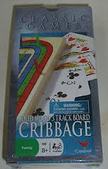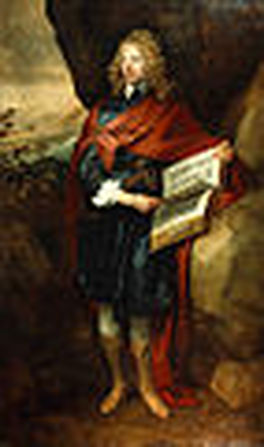 So my son recently received a cribbage game--a game I didn't know too much about but which looked fun enough. When we started to play, however, I happened to read this blurb on the packaging: "Cribbage is believed to have been invented during the 17th century by an English poet." What? Whoa! Cribbage is a 17th century game? Invented by a poet? What poet?! I had to look into this. So, of course, I typed in "History of Cribbage" into the almighty Google, and sure enough I found that "Cribbage was invented in the early 1600s by Sir John Suckling, an English courtier, poet, gamester and gambler." But since I tend not to believe what I read on the internet, I double-checked this information with the well-regarded Dictionary of National Biography. The DNB confirms the circumstantial evidence concerning the invention of the game, citing the biography of Suckling (1609-1641?), written by 17th century antiquarian John Aubrey (1626-1697) in his collection called Brief Lives.  Sir John Suckling -Courtier & Cribbage Creator Aubrey portrays Suckling as quite a merrymaker, anecdotally recalling him as "the greatest gallant of his time" (287). Suckling was, too, alleged to be the "greatest gamester, both for bowling and for cards." He had such a reputation for gambling, it would seem, that "no shopkeeper would trust him for 6d, as today he might by winning, be worth 200 pounds, and the next day he might not be worth half so much" (287-291). Surprisingly, Suckling wasn't actually very good at cards...a bit of a problem for a compulsive gambler. To make up for this deficit, he would "by himself abed, and there studyed how the best way of managing the cards could be." Indeed, he figured out a variation of an existing game--Noddy--which he called "cribbage." Apparently others liked cribbage as well, and he came to make a lot of money off of his reinvention. As Aubrey tells us: "Sir John Suckling invented the game of Cribbidge. He sent his Cards to all Gameing places in the countrey, which were marked with private markes of his; he gott twenty thousand pounds by this way." However, Suckling had a weakness for "Ladies of Quality, all beauties and young." This weakness ended up costing him "many hundreds of pounds," apparently because he enjoyed lavishing them with "silk stockings, garters and gloves." (Brief Lives, 289).
Fun guy, to be sure! Suckling, however, was more than a courtier and a ladies' man. He found time to write--quite prodigiously--and demonstrated some fine insights into the larger political context of the day. All told, he wrote seventy-eight poems, four plays, a few political tracts, as well as at least fifty letters, which according to Aubrey, displayed great intelligence and a "sparkling wit." (287-291) It's actually interesting to consider Suckling's personality when you reflect on the game. After all, cribbage offers a funny balance of strategy and luck, as well as a carefree leapfrog quality. Suckling's dual love of gambling and carousing at play? Just a thought. Eventually, his bad luck at gambling and in love seem to have caught up with him. Sadly, at age 28, when faced with great financial losses, Suckling poisoned himself, "which killed him miserably with vomiting" (291). A sad end...but at least he gave us cribbage. We think.
5 Comments
Danny
1/22/2013 10:51:34 am
I love cribbage and, although I've been playing for years, I never knew its origins. interesting
Reply
1/29/2013 10:37:14 am
Thanks Danny. I always think its interesting to learn the history/background of ordinary things. It makes me wonder, sometimes, how much we don't know.
Reply
4/8/2013 03:32:17 pm
Interesting article I have read here. Your discussion has brought the past history and social activities to live. The poet way of writing and inventing the interesting game like cribbage is an interesting article to read. I actually have never played the game before and I am going to try it soon.
Reply
9/5/2013 08:27:19 pm
I never had had a glimpse of Cribbage. Is it a card game? I have played Scrambles but this is entirely new to me. By the way where did you extract its historical background. There is a writer in you even while playing.
Reply
5/31/2021 12:33:38 pm
If you are looking for affordable or the Cheapest MRI Scan In Chennai then refer to Planmyscan.com
Reply
Leave a Reply. |
Susanna CalkinsHistorian. Mystery writer. Researcher. Teacher. Occasional blogger. Categories
All
Archives
May 2023
|
 RSS Feed
RSS Feed